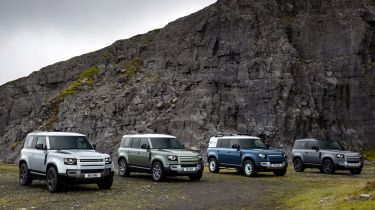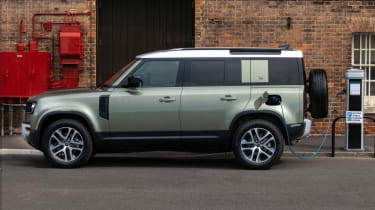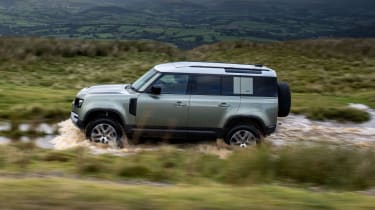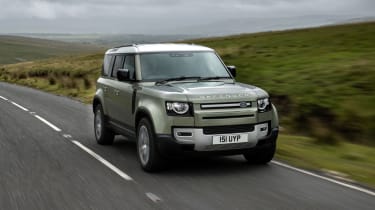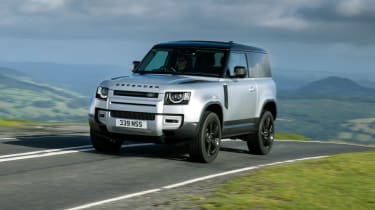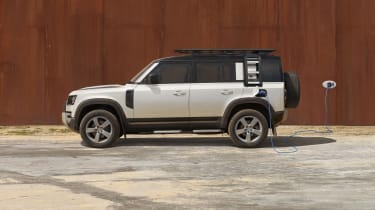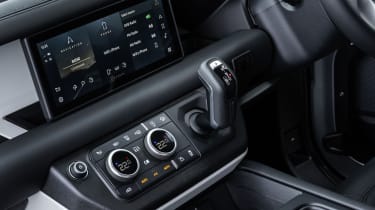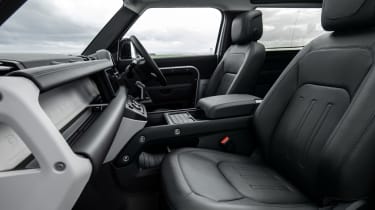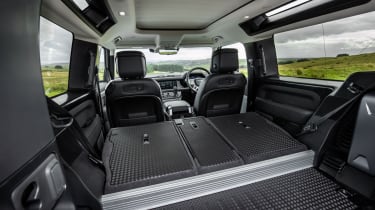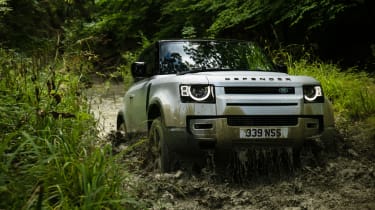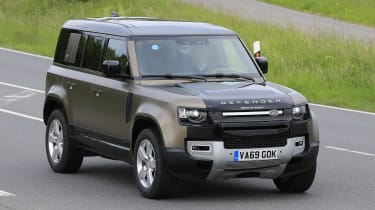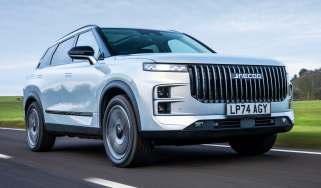2020 Land Rover Defender 110 P400e plug-in hybrid arrives
New Land Rover Defender now available with a PHEV powertrain and a new range of six-cylinder diesel engines
- • New P400e plug-hybrid model capable of up to 85.3mpg
- • Three new six-cylinder diesel engines introduced
- • New X-Dynamic trim level added to Defender line-up
JLR has announced several additions to the Land Rover Defender range, including the introduction of a new plug-in hybrid model, which becomes the most efficient available. Three new six-cylinder engines are now available, alongside a new mid-range X-Dynamic trim level.
2020 Land Rover Defender P400e plug-in hybrid
The new Land Rover Defender P400e plug-in hybrid features a turbocharged 2.0-litre petrol engine, an electric motor and a lithium-ion battery producing a total power output of 398bhp. It’s the quickest Defender in the range until the V8 model arrives next year, managing 0-62mph in 5.6 seconds.
The 19.2kWh battery offers a pure electric range of up to 27 miles and the P400e is capable of powering all-four wheels using only the battery, meaning it’s capable of off-roading without using the petrol engine. Officially, fuel consumption is quoted at up to 85.3mpg, with CO2 emissions of 74g/km.
The battery can be topped up at home using a 7.2kW wall charger, with 0-80% taking around two hours. A cable for rapid charging is also supplied, with a 50kW charger taking 30 minutes to give an 80% charge.
The P400e is only available as the five-door Defender 110 model and is fitted with air suspension and 20-inch alloy wheels as standard.
Engines and performance
The latest update to the Defender range sees the introduction of three new six-cylinder diesel engines, all with mild-hybrid assistance. These replace the outgoing four-cylinder engines, with the 197bhp entry-level D200 model taking 10.2 seconds from 0-62mph. The mid-range D250 produces 247bhp and takes 8.3 seconds, with the range-topping D300, which produces 296bhp, managing the benchmark sprint in only 6.7 seconds.
Full fuel economy and emissions specs are yet to be confirmed but JLR claims the D200 and D250 models can return up to 32.2mpg with CO2 emissions starting at 230g/km.
Every diesel model is equipped with JLR’s Intelligent All-Wheel Drive system, which is capable of shifting 100% of the engine's torque to either the front or rear axle as required.
The Defender’s standard petrol engine line-up remains unchanged, with the P300 model producing 296bhp, which propels it from 0-62mph in 8.1 seconds. It’s the thirstiest in the range, returning just 24.5mpg and emitting 262g/km of carbon dioxide.
The range-topping P400 engine combines a 395bhp petrol engine (with a turbocharger and a supercharger) and a 48-volt battery. It’s by far the quickest version available - 0-62mph takes just 6.1 seconds - but its mild-hybrid system slightly helps fuel economy. From this engine you can expect 24.7mpg and 260g/km of CO2.
Prices and specifications
The new 90 costs from £40,330 and the 110 starts at £45,600 for a Defender with the entry-level diesel engine but you can spend over £70k on a Defender 110 before options. Meanwhile, a Hard Top commercial model has joined the Defender lineup, with the 90 model starting from £35,820 plus VAT, rising to £43,012 plus VAT for the 110 model.
The entry-level model is simply called Defender but it comes with LED headlights, a heated windscreen, heated and powered front seats and the new 10-inch Pivi Pro infotainment system. Not only does this feature smartphone mirroring but it also includes Land Rover’s ClearSight Ground View camera, which can show you what’s in front of the vehicle off-road. The standard 18-inch steel wheels are painted white as a retro touch and a nod to the original Defender.
Upgrade to the Defender S and you’ll get 19-inch alloy wheels, a centre console with armrest and a leather steering wheel. SE brings larger 20-inch wheels, blind-spot assistance, an ISOFIX mounting on the front seat (110 model only) and premium LED headlights. Above that is the high-spec HSE, which adds matrix LED headlights, cooled front seats, adaptive cruise control, rear collision monitor and an opening panoramic glass sunroof.
The new X-Dynamic trim adds a satin finish to the front and rear skid plates, with a matching coloured front grille bar, and towing loops front and rear. It also features alloy wheels finished in either satin grey or gloss black and black mirror caps. Interior changes include illuminated metal skid plates and a new hard wearing ‘Robustek’ seat material that features a hexagonal pattern.
The top-of-the-range X model brings design tweaks, a black contrasting roof, a head-up display, illuminated metal tread plates, heated rear seats and the Terrain Response 2 software but you can only get it with the P400 straight-six mild-hybrid powertrain.
You can add a range of accessory and option packs, called ‘Explorer’, ‘Adventure’, ‘Country’ and ‘Urban’. All in all, you can choose from a dizzying 170 options, plus seven paint colours and 12 wheel designs.
The Explorer pack brings a raised air intake, a 26kg roof rack, a side-mounted gear carrier, wheel arch protection and a spare wheel cover, plus a matte black bonnet decal.
The Adventure pack includes the same gear carrier as the Explorer, an integrated air compressor, mud flaps, a portable rinse system with a pressurised water reservoir, and a backpack built into a rear seat.
The Country pack consists of wheel arch protection and a full-height loadspace partition – but deletes the spare wheel cover and the backpack.
The Urban pack includes bright-metal pedals, a spare wheel cover, a front undershield and a bright rear scuff plate. A larger range of alloy wheel designs are also available, including a 22-inch five-spoke design.
Technology
If you’re familiar with the previous Defender, you might be taken aback by the sheer amount of technology fitted to the new car. At the start of 2020, Land Rover showcased some of the car’s features, which include surround-view cameras and dual-eSIM modem connectivity. The latter has never been seen on a car before, and allows the 10-inch Pivi Pro infotainment system to stream music and download app updates at the same time, without a noticeable difference in loading times and system usability.
This technology is always on, thanks to a dedicated auxiliary battery, while the infotainment system and digital instrument cluster use the same operating system as Blackberry smartphones. There’s a new mobile app that you can use to preset the climate control before you get in the car, among other things.
Interior
Increasing the wheelbase has freed up more space inside, making the Defender feel more airy and user-friendly. In most ways, the dashboard is unrecognisable from the previous generation, as Land Rover has pushed the Defender upmarket and included the equipment that customers expect in a new Land Rover.
A magnesium cross beam runs the width of the dashboard, which has been left exposed and helps make the Defender more rigid. As you might expect, grab handles are included to help your passengers get in and give them something to hold over bumpy terrain.
Practicality
The bench seating from the old Defender is no longer available but the new Land Rover Defender will be able to carry up to eight people. All models come with the option of a third front-row seat (which no rivals offer), thanks to the off-road shifter being mounted on the dash. When it’s not in use, you can fold down the middle front seat to create an armrest and a storage cubby. The forthcoming 130 model will offer a third row of seats but it’ll be costly as it’ll only be offered on the top trim level.
The mid-size 110 is likely to be the most popular choice and if you go for this version you’ll have 1,075 litres of boot space with the seats in position and a massive 2,300 litres with the rear seats folded. In the larger 130, there’s a 231-litre boot with all three rows up, which expands to 900 or 2,223 litres if you fold one or both seat rows respectively.
Off-roading
Land Rover is confident that the new model is even more capable off-road than any previous factory-spec Defender. It can now wade through water up to 900mm deep - a whole 400mm more than the previous-generation car - and, when going through water, the car adjusts the suspension, closes the air vents and ensures the brakes continue to work. Approach angles have been improved so the car is less likely to ground itself when traversing a steep incline.
The company’s Terrain Response 2 system is available on some trim levels and the options list, and you can configure this to your individual preferences. All 110 and 130 variants get air suspension as standard, while it’s standard on the top-spec 90 and optional elsewhere.
The next-generation Defender has racked up over a million test miles in a variety of environments, including 50-degree deserts, the sub-zero Arctic, and the high-altitude Rocky Mountains in Colorado. The testing regime hasn't entirely focused on rugged terrain, as we also saw a prototype lapping the famous Nurburgring racetrack in Germany.
2021 Land Rover Defender V8 engine
A range-topping version of the new Defender that uses a V8 engine will soon be available, just as there was in the original Defender lineup. The modern iteration, which has already been spotted testing, is expected to use a 4.4-litre V8 borrowed from BMW’s biggest M Performance models, with around 500bhp and an automatic gearbox.
The Defender V8 should get close to or match the Mercedes-AMG G63’s performance. Unlike the 567bhp Range Rover Sport SVR, the Defender V8 won’t be produced by Land Rover’s Special Vehicle Operations (SVO) department. It’s likely that the Defender V8 will only be offered in five-door form.
See how the new Defender compares to the best 4x4s and SUVs you can buy in 2020.
Recommended

New Subaru Trailseeker revealed as rugged electric SUV with 375bhp

New Subaru Solterra brings more range, power and polish
Most Popular

Polestar 3 review – upmarket and well-built SUV contender
Newsletter signup form
Tips & advice

Car dashboard warning lights: what does each symbol mean?

Electric car charging stations: public networks, charger types, apps and maps


